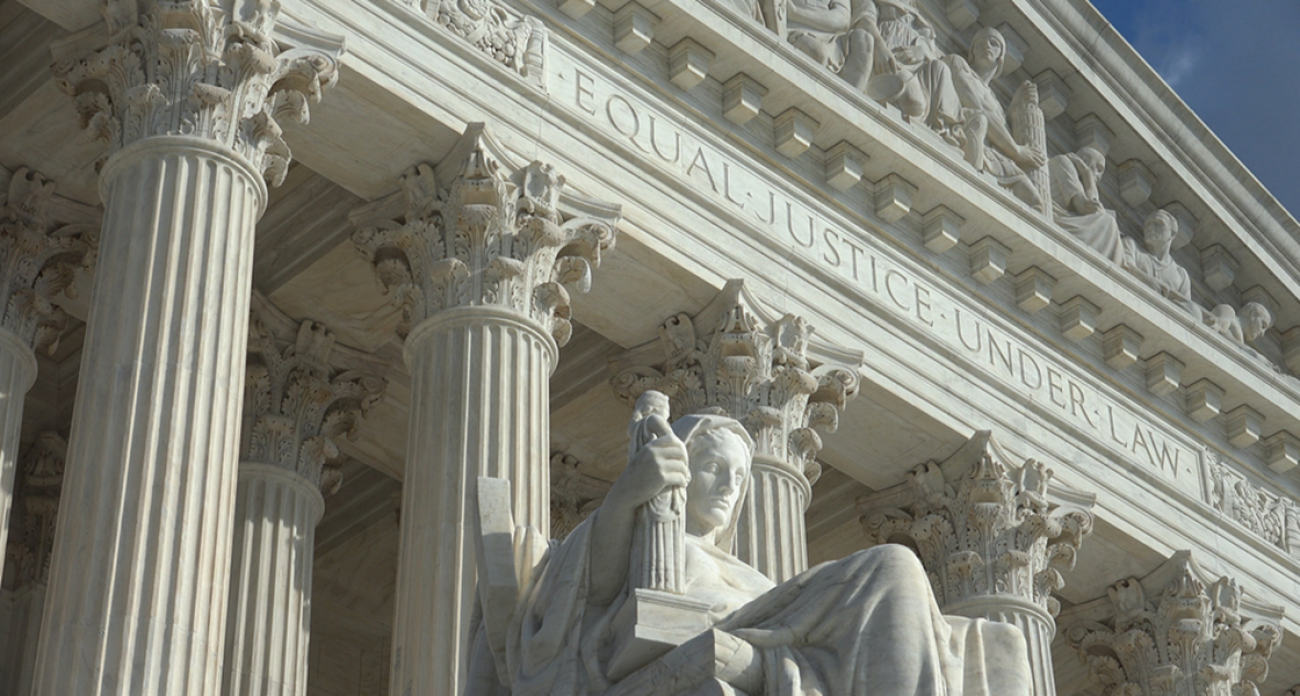What the U.S. Supreme Court gerrymandering ruling means for Michigan

October 2019: U.S. high court kills Michigan gerrymandering case ordering new districts
Michigan’s attempt to throw out Republican-drawn legislative and congressional district maps is essentially dead, redistricting experts said, following a U.S. Supreme Court ruling Thursday that said federal courts should play no role in deciding partisan gerrymandering cases.
That power, the court wrote in a 5-4 majority opinion penned by Chief Justice John Roberts, is a political decision reserved for the states and Congress.
In the short term, Thursday’s ruling means Michigan’s Republican-led Legislature will not have to redraw district maps to make them more equitable before the 2020 election, as a federal district court panel ordered this spring. The lower court had deemed more than two dozen of Michigan’s legislative and congressional district lines unconstitutionally gerrymandered to favor Republican candidates. Thursday’s ruling takes federal courts out of the partisan gerrymandering business, negating that order.
August 2019: Voters Not Politicians asks to intervene in Michigan GOP redistricting suit
But the ruling also represents an implicit endorsement of state-level efforts to thwart politically motivated redistricting. Indeed, Roberts specifically noted actions taken in several states to address allegations of unfairness, including a 2018 Michigan ballot measure that creates an independent commission to draw political maps, taking that task away from political parties. That commission is still being created and will not reconfigure Michigan electoral maps until after the 2020 census.
Related Michigan gerrymandering stories:
- Reaction in Michigan to U.S. Supreme Court gerrymandering decision
- U.S. Supreme Court halts order requiring Michigan to redraw political lines
- Michigan’s political districts illegally gerrymandered, court rules
- Michigan Republicans appeal gerrymandering ruling. What you need to know.
- Michigan’s political districts illegally gerrymandered, court rules
- Expert testifies gerrymandering in Michigan is worse than almost anywhere
- Redistricting guru: Michigan’s maps are legal, even if process was political
Groups challenging the Michigan districts, drawn by Republicans following the 2010 census, cited a slew of politically charged internal emails by GOP insiders responsible for drawing state and congressional maps. The challengers also noted that while Democratic and Republican voters were evenly split statewide in recent elections, Republicans had dominated the state Legislature, particularly the Senate, diluting the impact of Democratic voters.
Thursday’s Supreme Court majority, in addressing similar grievances from North Carolina and Maryland, did not dispute such partisan tactics took place. Rather, the court’s conservative justices concluded, federal courts were simply not the place to redress such shenanigans.
“Partisan gerrymandering claims rest on an instinct that groups with a certain level of political support should enjoy a commensurate level of political power and influence,” Roberts wrote, but the “Founders certainly did not think proportional representation was required.”
August 2019: Voters Not Politicians asks to intervene in Michigan GOP redistricting suit
“Federal courts are not equipped to apportion political power as a matter of fairness, nor is there any basis for concluding that they were authorized to do so,” he wrote.
Four justices appointed by Republican presidents joined Roberts. In dissent, parts of which she read aloud in court, Justice Elena Kagan called the majority ruling “tragically wrong,” saying those who engaged in gerrymandering “debased and dishonored our democracy.”
“For the first time ever, this Court refuses to remedy a constitutional violation because it thinks the task beyond judicial capabilities. And not just any constitutional violation,” she wrote. “The partisan gerrymanders in these cases deprived citizens of the most fundamental of their constitutional rights: the rights to participate equally in the political process, to join with others to advance political beliefs, and to choose their political representatives.”
The cases before the high court, Rucho v. Common Cause and Lamone v. Benisek, concerned partisan gerrymandering in North Carolina and Maryland. In North Carolina, it was Republicans who drew the contested maps; in Maryland, it was Democrats.
As those cases were being argued in Washington this year, a three-judge federal district court panel in Michigan ordered state Republicans in April to redraw district lines and have them approved by Democratic Gov. Gretchen Whitmer before Aug. 1, and to hold special elections for at least 10 state Senate districts in 2020. That order was placed on hold last month after Republicans successfully appealed the order to the U.S. Supreme Court.
State Republicans argued the Aug. 1 deadline would not leave enough time for a full appeal, nor would it give the Legislature sufficient time to redraw the maps.
The district court “foregoes any semblance of respect for state sovereignty, the presumption of legislative good faith, foundational principles of federalism, and First Amendment rights” in ordering the lines to be redrawn, lawyers for the Republican legislators argued in their request to the U.S. Supreme Court for a stay of the panel’s April order.
While the Supreme Court previously demurred on what role federal courts are to play on partisan gerrymandering (while still weighing in on other forms, including racially based gerrymandering) several recent lower federal courts found the practice to be illegal, including the court in Michigan, noted Michael Li, senior redistricting counsel with the Brennan Center for Justice at New York University’s School of Law, which advocates for redistricting reform.
“There is a really strong emerging consensus about how you police partisan gerrymandering and growing confidence in their ability to do that,” Li told reporters in May, shortly after another federal court threw out Ohio’s gerrymandered maps. That view was not shared by the Supreme Court majority.
Conservative lawmakers in Michigan celebrated Thursday’s high court decision, which they said rightly leaves political redistricting decisions out of the federal courts.
“This ruling is good news for representative democracy and makes clear that districting decisions belong with the democratic process and not in court,” said Charles Spies, an attorney with Clark Hill PLC who represented Republican legislators and members of Congress in Michigan’s lawsuit.
Here are key implications for Michigan of Thursday’s decision:
First, a refresher on Michigan’s gerrymandering case.
The League of Women Voters of Michigan filed suit in 2017 in U.S. District Court, challenging the legislative and congressional maps drawn in 2011 while Republicans held control of Lansing, a majority they still hold in both chambers.
The case unearthed emails dating back to 2011 that showed Republicans bragging about how their district maps would preserve their political advantage.
A trial was held in February in Detroit, leading to the bombshell ruling in April in which a judge wrote “this Court joins the growing chorus of federal courts that have, in recent years, held that partisan gerrymandering is unconstitutional.” That decision has been appealed.
After November’s elections, Republicans saw their state majorities shrink to 22-16 in the Senate and 58-52 in the House, despite significant help from advantageous district lines. Michigan's congressional delegation is now split 7-7 after previously tilting Republican.
So, does that mean the Michigan case is dead?
Likely, yes. Along with similar pending cases in Wisconsin and Ohio.
“The Michigan case is essentially gone,” said Li, of New York University’s Brennan Center. “There will be no more partisan gerrymandering litigation in federal court.”
The court’s conservative majority held, among other things, that there is no reliable constitutional standard to determine what’s fair when drawing district lines. And the lack of such a standard means federal courts can’t determine the legitimacy of such maps without being endlessly drawn into challenges from state to state.
The court, Roberts wrote, has “struggled without success over the past several decades” to set such standards for courts to decide what constitutes partisan gerrymandering. While maps in North Carolina and Maryland “are highly partisan, by any measure,” he wrote, “the question is whether the courts below appropriately exercised judicial power when they found them unconstitutional as well.”
Despite such “blatant examples of partisanship,” Roberts said federal courts could not weigh in, writing “there are no legal standards discernible in the Constitution for making such judgments, let alone limited and precise standards that are clear, manageable, and politically neutral.”
Even if election fairness can be defined, Roberts asked, are courts really in a position to determine how much partisanship “is too much?”
In her dissent, Kagan, joined by the court’s three other liberal-leaning justices, mocked the notion that courts had no workable legal standards to apply, noting that lower courts in several states have coalesced around standards for determining when political lines are extreme. In the Michigan lawsuit, and litigation from Ohio, Kagan cited advanced computer technology presented in court that she said allows judges to determine when political maps fall outside the realm of fairness.
Responding to Roberts’ question on partisanship in North Carolina and Maryland, Kagan wrote, “How about the following for a first-cut answer: This much is too much.”
Li told Bridge that Thursday’s ruling means the court “definitively slammed the door shut now” on federal lawsuits, “so people are going to have to go look elsewhere” for a remedy.
The Supreme Court has not yet taken up Michigan’s case, he said, but it’s now likely to be dismissed and/or reversed.
What does this mean for Michigan House and Senate candidates?
“It’s the status quo through the next election,” said Eric Lupher, president of the nonpartisan Citizens Research Council of Michigan.
The district court’s April decision ordering state senators from certain districts to run in special elections in 2020 is now effectively dead, so no special elections or redrawn maps will be required before the next general election.
“The U.S. Supreme Court basically said this isn’t a role for the (federal) courts to be trying to decide, so there’s some state senators that can breathe easy this morning,” Lupher said.
One caveat could be if someone brings action against Michigan’s maps in a state court, said Li, though he added that he has not yet heard of anyone aiming to do that.
So is there no way for states to challenge partisan gerrymandering?
There’s a way, experts tell Bridge, but it’s going to be harder.
The court’s decision closes the door to federal challenges of partisan gerrymandering. State supreme courts now appear to be the highest level of legal recourse people can seek if they believe voting district lines have been politically manipulated. In his ruling, Roberts specifically cited a Florida Supreme Court decision to demonstrate the options available to challenge state political maps.
“They left a number of other remedies open,” said Mark Brewer, former head of the Michigan Democratic Party and an attorney representing the League of Women Voters and other plaintiffs in Michigan’s gerrymandering lawsuit. “For the moment, all of those options (are) on the table.”
In states such as Michigan where ballot initiatives are possible, activists can suggest citizen redistricting commissions. On the federal level, Congress too can choose to enact laws outlawing partisan gerrymandering or attempt to limit it.
“A lot of states will be watching what (Michigan does) in 2020 and 2021 with our citizen commission and asking if it’s working, if it’s worth replicating,” said Lupher.
However, those avenues provide much weaker protection against partisan gerrymandering, contends David Daley, author of “Ratf**cked,” a book that details how gerrymandering affects state and national politics. Many state supreme courts may choose not to take up the cases, and Congress is subject to the same political influences as state legislators.
“I think that is another disingenuous fairytale that the Chief Justice is spinning,” Daley said. “It’s very naive as to both the problems that gerrymandering presents and the current realities of our polarized politics.”
Daley said it’s likely partisan gerrymandering will now increase in other states.
“Because the Supreme Court said the doors to the federal courts are closed, legislators nationwide will be able to engage in an unfettered orgy of partisan gerrymandering in 2021 without any fear of consequences,” he predicted.
Does the decision affect Michigan’s new redistricting commission?
No. Michigan voters approved a new independent redistricting commission in 2018 through a statewide ballot initiative. That commission will still draw new lines after the next census in 2020, with the first election under its maps scheduled in 2022.
The U.S. Supreme Court decision “speaks to the power that the citizens have in Michigan and the strategy and forethought that they have, too,” Katie Fahey, who directed Voters Not Politicians, the group behind the 2018 success of Proposal 2 to implement Michigan’s redistricting initiative, told Bridge. Fahey now directs a national organizing group, The People.
Thursday’s ruling “just reaffirms that our urgency (in Michigan) around making sure we address this at the local level was justified.”
What do Michigan politicians and others involved in the redistricting effort think about the Supreme Court ruling?
Opinions immediately following the decision fell cleanly along party lines: Michigan Republicans lauded the court’s ruling, while Michigan Democrats lamented it.
Republicans said the decision supported their arguments that redistricting is best left to elected officials.
“Today's ruling suggests that a federal court should not be in the business of redrawing Michigan’s Senate maps mid-term, as we have argued all along,” said Amber McCann, spokeswoman for Senate Majority Leader Mike Shirkey, R-Clarklake.
Democrats expressed disappointment with the decision and said it illustrated why Proposals 2 and 3 — passed by state voters in 2018 to implement a redistricting commission and expand voting rights, respectively — were so important.
“The Court had a significant opportunity today to help put a stop to the damage caused by political gerrymandering, but chose instead to reject their most important responsibility,” said House Democratic Leader Christine Greig, D-Farmington Hills.
“This decision shows us the importance of fully committing ourselves to implementing the voter-approved measures that would provide greater access to voting and put the redistricting process in the hands of the people.”
For more reactions from officials in Michigan, read a full list here.
See what new members are saying about why they donated to Bridge Michigan:
- “In order for this information to be accurate and unbiased it must be underwritten by its readers, not by special interests.” - Larry S.
- “Not many other media sources report on the topics Bridge does.” - Susan B.
- “Your journalism is outstanding and rare these days.” - Mark S.
If you want to ensure the future of nonpartisan, nonprofit Michigan journalism, please become a member today. You, too, will be asked why you donated and maybe we'll feature your quote next time!




